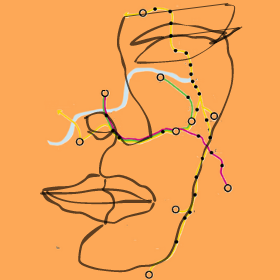By Marisse Cato

The Japanese/British composer moves toward electronic practice, (re)presenting
past stories and cultural traditions through new mediums. Her music warps familiar sounds into abstract amalgamations of larger sonic masses. The result – something that projects you beyond earthly time, toward somewhere multitemporal.
Searching for a more self-contained practice, she came to electronic music as a
means to manifest ideas without needing to rely on ensembles or institutions.
Especially during lockdown, she became increasingly drawn to the idea of making an album and the album as a medium for composition. The result being the 2022 release of “Astrophilia”, her debut album with Per Runberg.

Love of and/or obsession with planets, stars, and outer space – the album is at once ancient and otherworldy. Field recordings, electronic processing, Viking folk
instruments, contemporary voice, and string quartet mix to curate this sound
tapestry. Considered processing transforms what would have been a folk recreation into a slow-moving, unnerving series of transporting tracks.
Jasmine has worked across a range of mediums with notable performance venues including the Tate Modern and Barbican. Her increasingly wide artistic practice has incorporated instrumentalists, singers, visual artists and dance in both composed arrangements as well as improvisatory electronic performances.
Three double basses, cassette player and electronics comprise a piece Jasmine is currently working on. Scottish fiddle playing is her tradition of choice on this
occasion. Captured by that granular quality of old field recordings, Jasmine is
blowing sounds out of proportion and re-assembling them into a colossal melting pot soundscape. Described aptly by a friend as sounding like “all the music that has ever been heard in a cathedral played all in one go”, this incoming work will be compelling as the eye deceives the ear.
JM: A large component of the piece is manipulating the audience’s ear with the
cassette player placed in the middle of the room which will seem as though it is
producing all the music, but it’s only producing this white noise…I really wanted to
find instruments that could make deep, low sounds but also very intimate textures…I felt like the double basses could do this. I’m also really drawn to unwanted sounds and found sounds..[I] think about it all as a sort of soundscape.
MC: And how do you think of your audience in this experience of the soundscape? Where are they positioned in relation to the sound?
JM: I imagine someone being at the centre of the sound mass. And the way the
music unfolds around them is the structure of the music itself…Sometimes people
ask where your music is going. And I think that can be a limiting way of thinking
about things. I don’t think music necessarily needs to go anywhere. As long as the sound envelops your ear…ideas unfold along the way, I’m happy. I want people to bring their own statement to my music and that’s a much more interesting way of opening up my art to other people.
Electronic v.s. acoustic – who will win out? For Jasmine, the two creative processes have felt completely different and in some ways their processes in her practice unreconcilable. Electronic music feels a lot more intuitive and allows much more space to trust her intuition. It invites freedom to explore things that sound surprising and embraces that as part of the experience. Comparatively she’s “actually quite rigid and very anal” about having her music performed when it’s written down and fixed. With regard to the two creative processes, she jokes “there’s never been a way I can use like 110% of my brain and make all things come together.”
The shift to electronics also shaped her conceptual approach to composition. “I
started to approach concert music in terms of ‘tracks’ as opposed to ‘movements’. When I was getting bogged down in these big, saturated works, I found it very difficult to work with the resources I had at the time. Writing electronically made my work more accessible and contained.”
“I am not by any means a technological person. I really hate sitting at a laptop. I hate figuring stuff out. I hate having to download software. I hate watching tutorials. But I had to put myself though some of that to get to these sounds in the shortest way possible. And to me the process is not that important. It’s the end sound that’s important.”
With relation to another incoming work, a short opera centring on the diary entries of Tsar Nicholas II during the Russian Revolution she notes “I have a lot of expectations of myself to do the history justice.” Whilst the means, processes and formats may change, Jasmine’s commitment to captivating sonic experiences, drawing poignantly from the past remains in making the most convincing work possible.
Instagram- j.asminemorrismusic
SoundCloud – Jasmine Morris
Spotify – Jasmine Morris
Website:www.jasminemorris.co.uk

Leave a Reply